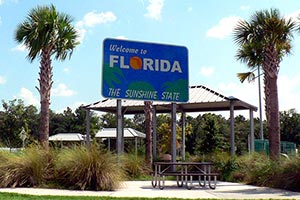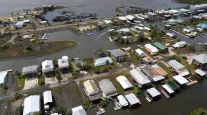Truckers Face Dearth of Rest Stops Along Florida's I-4 Corridor

Brad Bergstrom has been crisscrossing the country in his tractor-trailer for nearly four decades.
As he prepared to leave an Interstate 4 rest area in Longwood on a recent morning to haul Florida produce to Minnesota, the Nashville, Tennessee, trucker felt lucky to have found a spot to spend the night.
"Florida is the worst" in providing rest areas for truckers, said Bergstrom, 59. "Most of the rest areas — like this one here — are just too outdated and small. ... And there are just more trucks on the road today."
With the number of big-rig trucks on I-4 and other highways expected to increase by more than 30% over the next 25 years, Central Florida leaders are taking notice. Seminole County Commission Chairman John Horan is pushing for "a regional discussion" on building new places for truckers to rest, refuel and reload.
"It's part of a larger problem in that we don't have enough facilities here in Central Florida, where truckers can do what they need to do: refueling, maintenance and getting the rest that they need," Horan said.
MetroPlan Orlando, which sets transportation policies in Orange, Seminole and Osceola counties, recently asked the state Department of Transportation to take an inventory of truck rest areas in Central Florida and several other nearby counties.
"This is a huge issue throughout the state," said Harold Barley, MetroPlan executive director, "and it's a result of a growing economy and population growth. …The majority of freight does move by trucks, and it's the stuff that's being delivered to our homes and businesses."
The inadequacy of truck rest areas across the region recently became apparent in Seminole as an increasing number of truckers started parking along the shoulders of I-4 near the two rest stops just north of state Road 434 for lack of empty spaces.
Nearby Seminole residents complained and pressed the transportation department to either move or shut down the facilities, saying the parked trucks create noise, air pollution and a safety hazard by sitting along the interstate's shoulders. Seminole commissioners then passed a resolution last July in support of residents' demands.
But the state then backed off plans to relocate the rest areas to Volusia County near the state Road 44 and I-4 interchange after Volusia leaders strongly objected, saying it would hinder the county's efforts to develop that vacant land for high-end industries.
"Seminole approved all that development near the rest stops, and now they want to move those rest stops to Volusia," Volusia County Council member Pat Patterson said.
So far, no solution has emerged — and the problem just gets bigger.
Between 2010 and 2015, the number of miles traveled by trucks on Florida highways has grown by 18% to nearly 27 million miles, figures show. The average amount of truck traffic on I-4 near the rest stops has increased by 6% to nearly 9,100 trucks daily within that same time period.
According to federal regulations, truckers are required to stop and rest for 10 hours after driving 11 hours within a 14-hour shift.
"But there are just not enough rest areas," said Ken Armstrong, CEO of the Florida Trucking Association. "It's really an epidemic problem, especially along I-4."
Besides the two public rest areas in Seminole, there are two others — one in each direction — in Polk County, just west of County Road 557.
If the rest areas are full, truckers reaching their driving time limits often resort to parking on the shoulders, in vacant strip malls or in large parking lots. Truckers also use private truck-fueling stations, such as a Love's Travel Stop, including two in Polk County.
"It can be a huge problem finding a place to park," said Desiree Ann Wood, a trucker and president of the group Real Women in Trucking. "I sometimes park behind a strip mall and hope no one kicks me out or that it's safe. ... People want to build houses, shopping centers and shopping malls. But they don't want to see the trucks."
Horan said it's crucial for the region to focus on the need for more rest areas given the importance of the trucking industry to Floridians' everyday lives.
"We've got a growing population, and we've got a population that gets pretty much everything shipped here by trucks from someplace else," he said.




